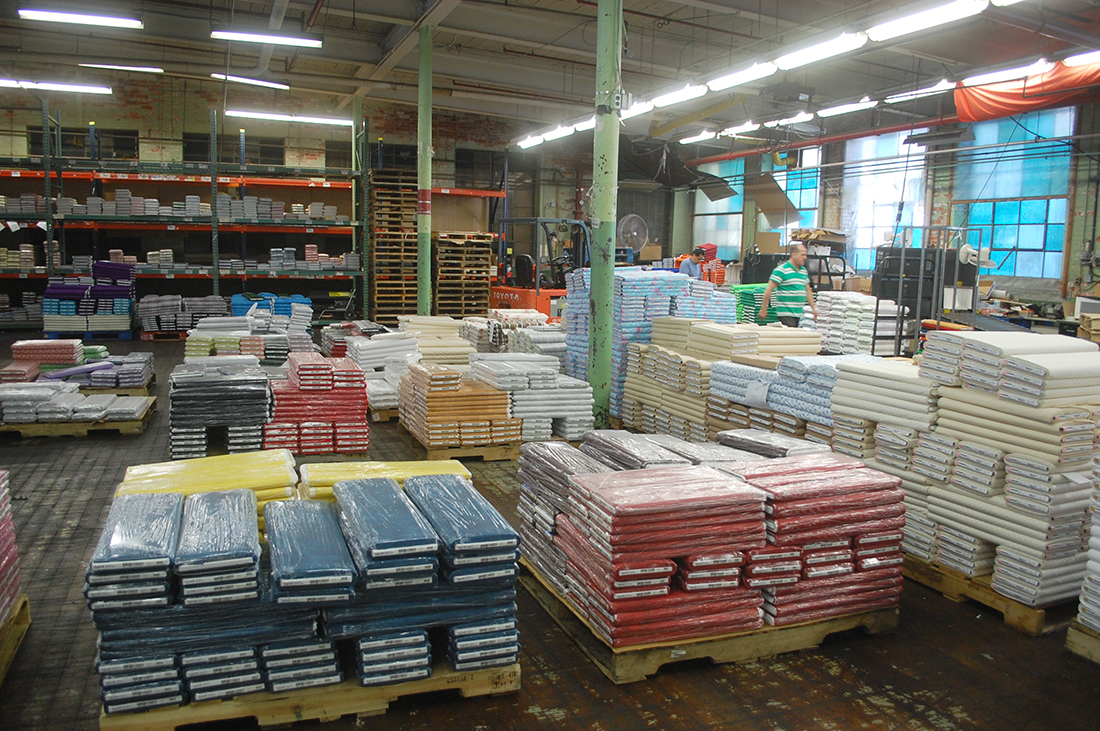
The General Fabrics warehouse, home to P&B Textiles. The company was bought this year by Brand & Oppenheimer.
The Odessas have been in the fabric business for a very long time. David Odessa, 55, and his brother, Ed, 63, run P&B Textiles, a division of General Fabrics, in Pawtucket, Rhode Island. Their father ran it before them and his father sold fabric, too. Over the course of three generations, the nature of the business has shifted dramatically, and responding to those changes hasn’t always been easy. Last year David and Ed nearly lost their business entirely.
In February, the Odessas sold General Fabrics to Brand & Oppenheimer, another Rhode Island-based textile company. The sale has given their family business a fresh start right when they needed it and now the company is poised for growth for the first time in years.
The founding of General Fabrics
In the late 1800’s, David and Ed’s grandfather, David Odessa, a Russian Jewish immigrant, settled in Providence, Rhode Island, and became a jobber. “He jobbed everything he could find to job and then he got into fabrics and started jobbing those,” David Odessa tells me on a sunny June morning at the company’s headquarters, a converted schoolhouse attached to a former Johnson & Johnson factory.
In the 1940’s, David’s son, Benton Odessa, came to work in the business, exporting the jobbed fabrics to Central and South America. Benton also began buying mill end pieces of greige goods, seaming them together and roller printing them (screen printing wasn’t feasible because the screen would jump over the seams) to sell to companies that would service the chain fabric stores.
Servicing the chains
In 1978, Benton’s son, Ed, began working with his father, and a few years later his brother, David, joined him. Together they decided to cut out the middleman and sell fabric directly to the chain stores themselves. Within 15 years, General Fabrics had become a major fabric supplier to Wal-Mart, JoAnns, House of Fabrics, Hancock Fabrics, Clothworld, “and all those guys that aren’t here anymore,” David says.
By 2001, 50 percent of General Fabric’s sales volume was coming from Wal-Mart and the Odessas began to feel that their company was at risk. Chain fabric stores were closing; those that remained were beginning to source products directly, including fabric. “We saw the writing on the wall that there was no future there,” David says. It was time to diversify.
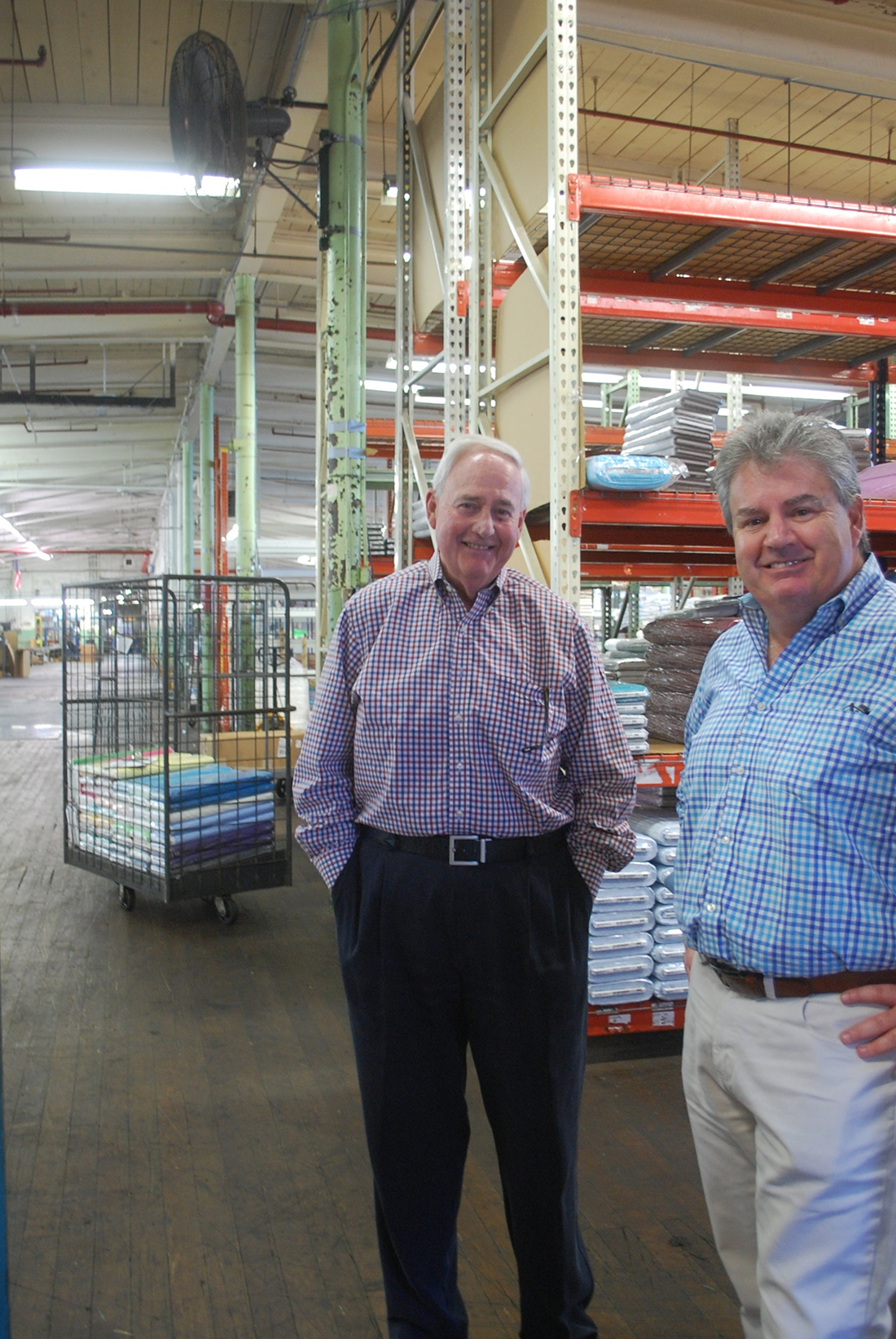
Ed and David Odessa stand on the floor of their warehouse in Pawtucket Rhode Island. Their grandfather bought the building which was once a Johnson & Johnson bandage factory.
Creating for the independent market
Independent quilt shops offering premium quality fabrics, specialty notions, and classes were popping up all over the country. In 2001, the Odessas met a stylist and a salesperson from competitor, Benartex, and hired them to start a new division called Red Rooster, catering to the independent market. In 2009, they bought P&B Textiles, an established brand already serving the same market, to expand their portfolio.
Meanwhile, the chain store market deteriorated further. When Hancock Fabrics went bankrupt, General Fabrics took a major financial hit. Then Wal-Mart began sourcing almost all of their fabric directly. “It nearly knocked us out of business,” David says. In 2015, the Odessas pulled out of the chain store business entirely with what David describes as “a lot of collateral damage.”
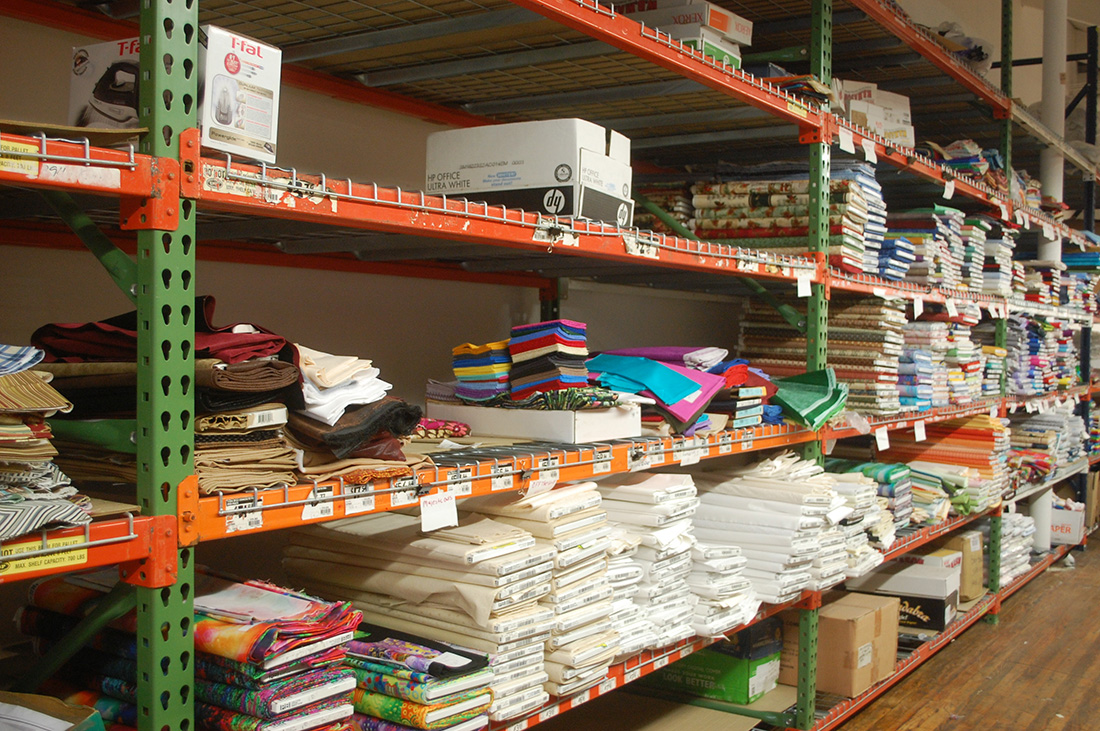
The sample room at General Fabrics.
Letting go of Red Rooster
“We made the decision to really shrink our business and things financially turned pretty bad for us,” David says. Analyzing their remaining assets they realized they needed to shut down Red Rooster.
“Red Rooster was killing us—the cost of product development, sampling, and just the overhead of running it. P&B Textiles is mostly basics and digital and we could keep a low overhead, but you had to keep an image with Red Rooster. New patterns, paying freelancers, it was astronomical.”
According to David, from 2011-2016 the competition among fabric companies serving the independent market grew exponentially.
Even with just one brand, the Odessa’s business continued to suffer. They were in an expensive spiral of downsizing, trying to lower overhead fast enough to keep up with dropping sales. “We lost some very valuable designers because we couldn’t pay their royalties on time, so they left,” Ed says. Staff members were becoming demoralized.
A way out
Just when the company nearly hit rock bottom, David’s phone rang and he heard a familiar voice. It was Eddie Ricci, someone he knew well from the fabric community in Rhode Island. Also a third generation textile executive, Eddie was now CEO of Brand & Oppenheimer, a company he and his business partner, Ben Galpen, had grown from $20 to $50 million through streamlining and strategic acquisitions. He wanted to know if General Fabrics was for sale.
“The timing wasn’t right,” David says. “We needed to fix our business.” The Odessas spent a year and a half restructuring to make General Fabrics more attractive to an equity partner. Then they called Eddie back. The deal closed February 1, 2018.
Brand & Oppenheimer owns a suite of textile companies serving the military, tactical, commercial, apparel, industrial, bias bindings, trim, and specialty end items markets. Quilting cottons was a welcome addition to their portfolio.
Once they’d been acquired, General Fabrics was immediately financially viable again. Orders started coming through and deliveries were going out which invigorated the sales team. “It’s been really good. It’s been great,” David says with a smile. “We’re able to make commitments and keep them.”
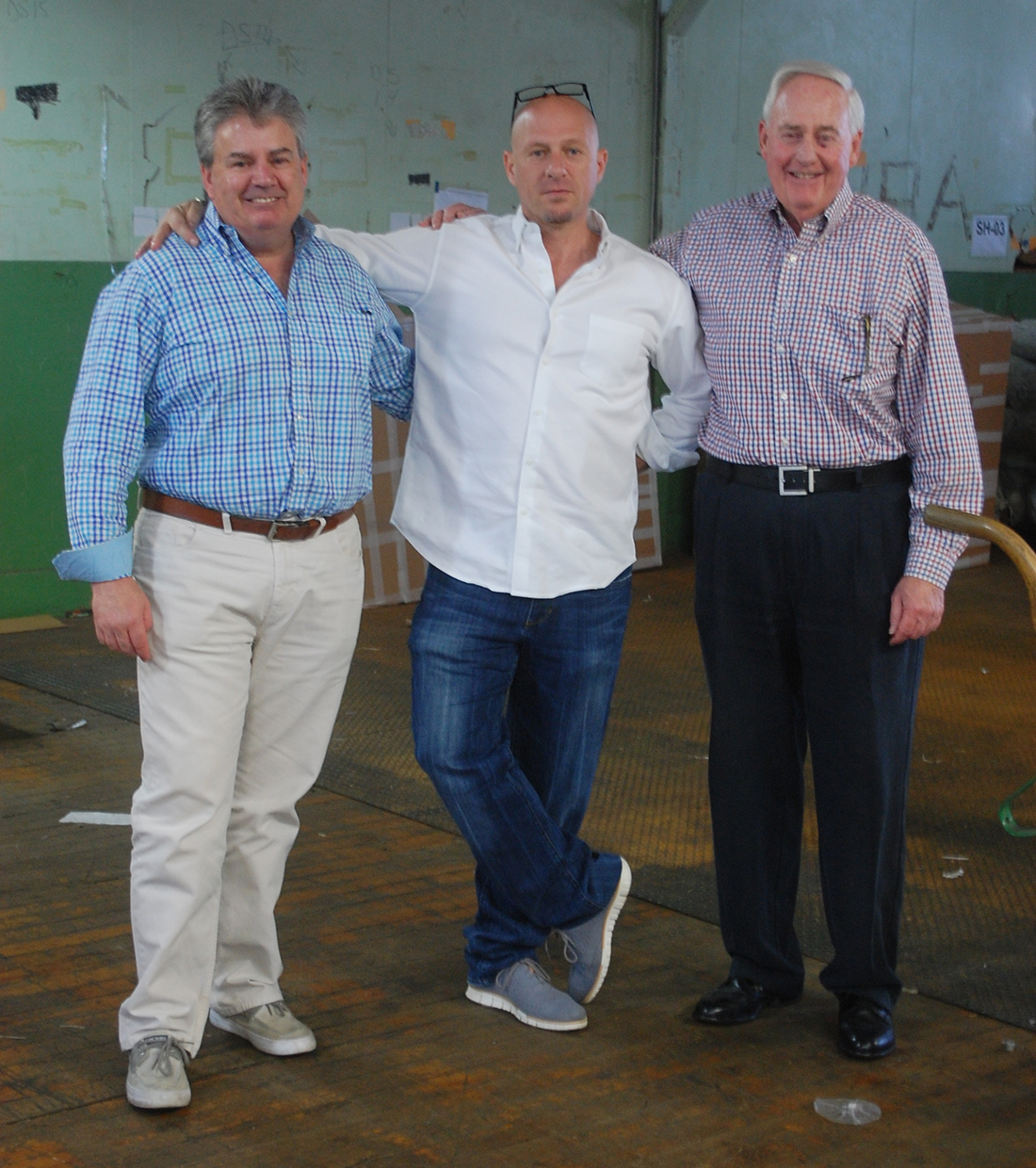
David Odessa, Ed Ricci, and Ed Odessa.
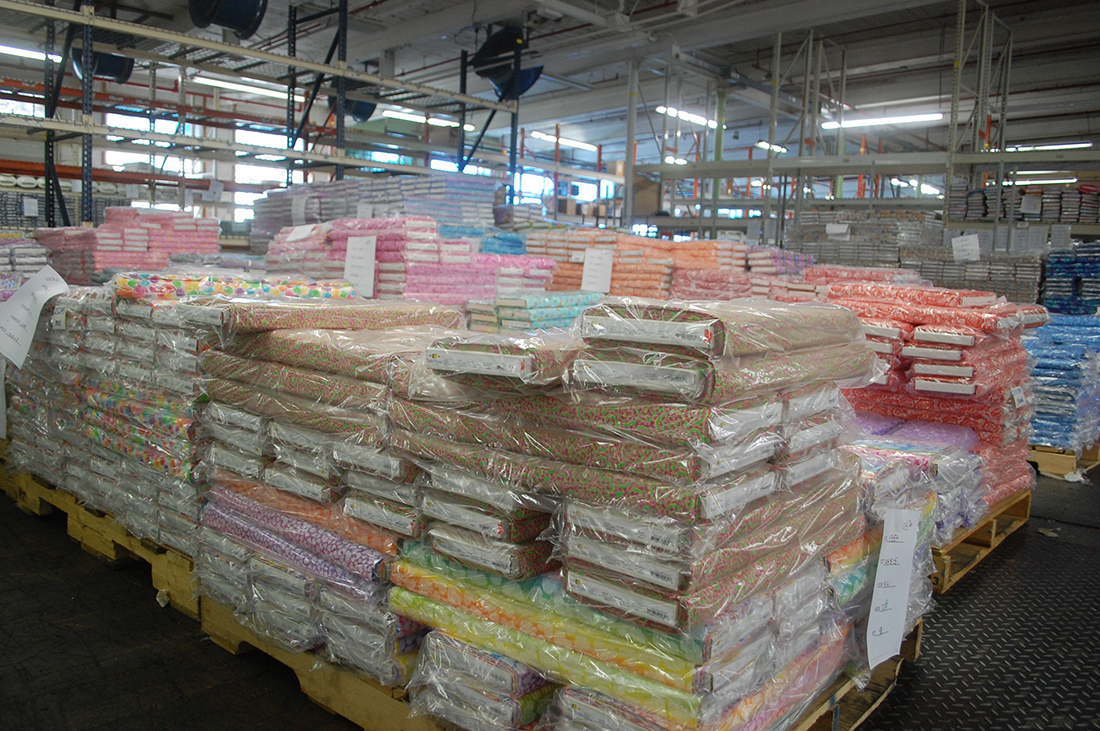
Quilting cotton doubled, bolted, and ready to ship from the General Fabrics warehouse.
When asked what would have happened if Eddie hadn’t bought General Fabrics, David said “Without Eddie, we wouldn’t have made it to 2018. But now we’re strong. Thanks to Brand & Oppenheimer we’re viable. It’s not just the money part, it’s the people part. They’re behind us. They want us to succeed.”
His brother, Ed, nods his head. “They’ve been a tremendous ally. It’s really a new beginning.”

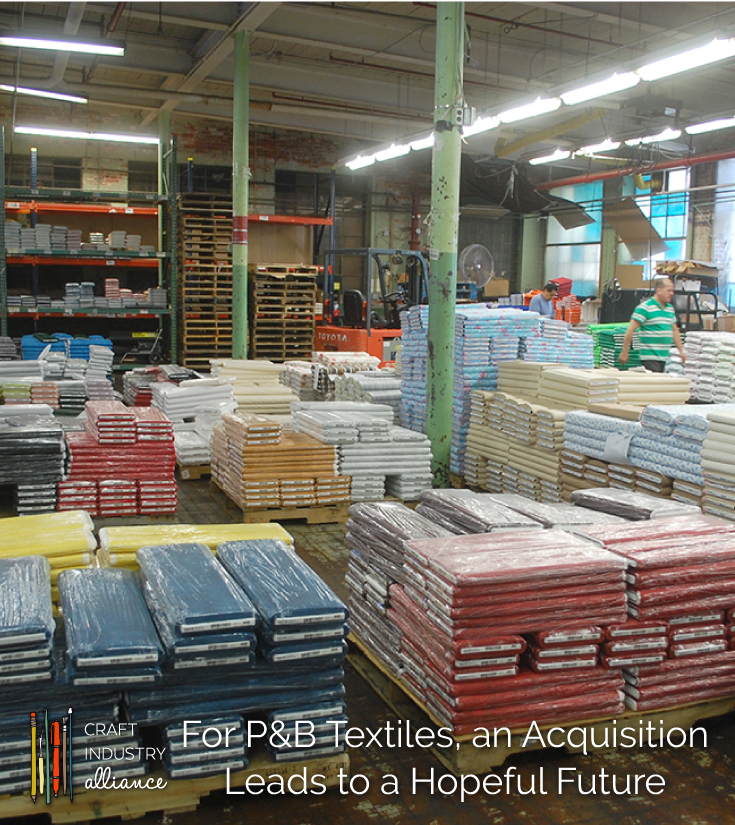
I had the opportunity to meet Ed earlier this year, and found him to be refreshingly honest, open, and genuine. In the early days of my launching my business, many of the basics I used in my finished quilts were P + B. I also have a soft spot in my heart for Rhode Island, having gone to school there, and wish P + B all the success they deserve!
I love a great comeback story! I, too, have a soft spot in my heart for P&B. Best wishes for continued success!
I have known the whole Odessa family most of mylife and they are wonderful family!
Family businesses are especially difficult and to see theirs survive and evolve is a great tribute to them.
I wish them all of the best!
For many years I’ve been fortunate to license my art to many national and international companies , rarely have I worked with such Fair , caring and understanding company owners as the Odessa family and their employees . Congratulations on your merger … Looking forward to the future .